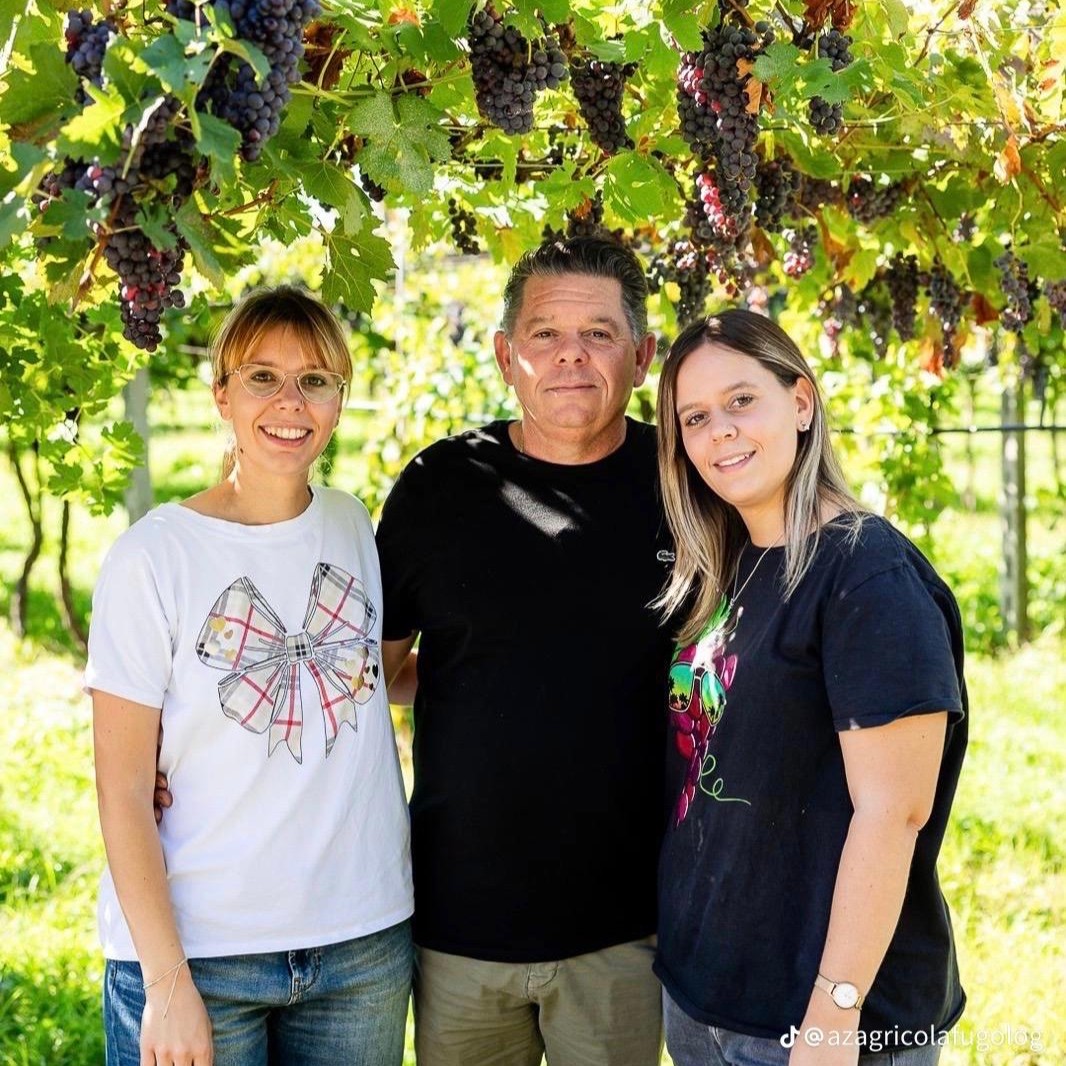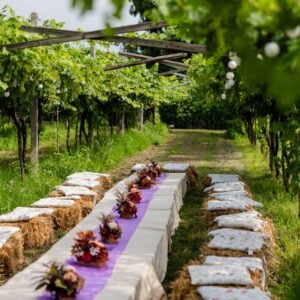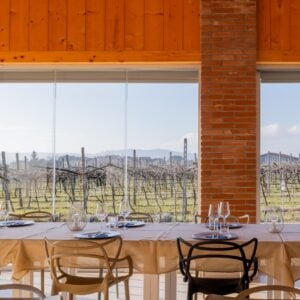
With today’s article, we inaugurate a series of articles that, combined with the “Aperitifs with the producer” scheduled at our headquarters in Corso Castelvecchio 3a in Verona, will lead you to discover some small businesses in our area with which we have the pleasure of collaborating. More than interviews, these are chats with producers who, through some key words, will explore the values and vision that guide every choice made in the cellar.
So let’s start with the Fugolo Gianluca farm, a family-run winery located in Pescantina, founded in 2017, but with four generations of winemakers behind it. The business is now managed by Gianluca and his daughters Sofia and Michela, who we met for this occasion.
The first word I’d like to examine is ROOTS. In addition to the fact that you are the fifth generation here in Pescantina, you have these centuries-old vines, whose roots are very deep. I am always fascinated by your explanation of the difference between the roots of peach trees, which develop horizontally, and those of vines, which are able to penetrate very deeply in the soil. Another idea I offer you is also the fact that you are rooted here in Pescantina as the headquarters of the company, rather than in Valpolicella, which is a region with a great wine reputation. Here in fact you also have a vineyard that you are very fond of and have decided to keep it as your grandfather planted it. I personally really like the work you do on IGT wines, e.g. Garganega and Corvina, wines that do not follow the trend of the more famous DOC wines of Valpolicella, but represent more of your identity.
- It’s true, you hit the nail on the head, the idea of roots is an important word for our family. Precisely the idea of putting down roots here in Pescantina, because our grandfather and our great-grandfather, moving from Padua, when they arrived here in Verona put down, or rather, re-put down their own roots and tried to pass on the work of the land to future generations. So it’s an important word because it’s linked to the land and to the fact of having chosen this land, because he could have moved to other parts, but when they arrived here in Pescantina, our grandfather understood that it was in his place. So he planted the peach trees first, with these horizontal roots, and then he planted the vines, whose roots instead go deep, symbolically anchoring the family to this territory. The idea of having deep roots is a value that we carry forward and that we try to convey also to the customers who come to visit us in the company, making them understand that many people in our family have come to work on this vineyard.
I was also thinking about the fact that the characteristics of this vineyard are not among the most ideal, as we are in the plain and the soil is typically fluvial, therefore rich in sand and pebbles. However, you do not consider this as a disadvantage, but try to make your best from this condition.
- Exactly, the idea of maintaining an old vineyard with these characteristics was passed down to us by our grandfather. In fact, he had seen this disadvantage and understood that the secret for obtaining quality wines was to play with vines that were not five or ten years old, but that had a little more “experience”, so that they were able to exploit not the surface soil, but that they were able to penetrate deep down, reaching the nutrients they needed. It is not always easy, but we try to exploit and find the quality within these vines by understanding what type of soil we have available. So, even if we now have other tools to understand it, already with the intelligence of the time, our grandfather had decided to plant the vines because he had understood the soil he was on and that the vine works differently from the peach tree. He thought that if he could grow a vineyard of a certain age, where the old vine can descend further and find a layer of superior quality, everything would benefit, especially the fruit and consequently the wine. So in this case, grandfather’s intelligence was to maintain this setting without thinking only about producing, and this is helping us a lot even today.
As a second word, you anticipated me earlier when you said that you try to make people who come here understand the importance of your vineyard in Pescantina. In fact, I wanted to talk about HOSPITALITY, which I think is a very representative element of your company. Very interesting is the fact that as far as you are concerned, hospitality goes in two directions: the people who come here and visit the winery, but also you who bring the company directly to the homes of customers through social media. In short, both of you are young women, Gen Z as they say, and therefore the channels you have available today to convey your work are different from those that once existed.
- Exactly, hospitality is certainly an important part of our activities, which was undoubtedly passed down to us from our father. Ever since we were little, he would let anyone who came to his cellar taste the wines from the tank, and would stop to talk for hours, telling them about our family, the wines he produced, and how he produced them, even though he couldn’t sell them because we didn’t have them in bottles yet. When we were little girls, it seemed like a waste of time, we preferred to go and eat ice cream; over time, however, we also learned to welcome those who come to visit us in the company and to tell our story even during the events to present our wines. The idea is precisely to transmit and donate a little piece of our work and our passion, and share our favorite places with those we meet. Because in the end, we were born inside our vineyards and our peach orchards, and it is important to us that a person who visits our company for two hours, one hour, or even just to take a few bottles, can enjoy a moment of relaxation. Hence the idea of the walk in the vineyard, because we have seen how starting the visit by reconnecting with nature can really change people’s mood. Sometimes we don’t have time to take two hours off and slow down the pace, instead nature’s teaching is that we must not speed up and we must get back into the right rhythm. So I would say that it is a fundamental part for us, because it transmits to people our work, sacrifices and fatigue.
So, the welcome in the cellar is certainly vital for you, but, as we were saying, there is also the part of sharing on social media, which may be a little more difficult, because, knowing you, I know that you are pretty reserved people, but in these times it is necessary to make your reality known to a wider audience.
- Yes, it is a fundamental part because through social media you can reach new people, who perhaps you wouldn’t reach with word of mouth. It wasn’t easy at the beginning, even if now we’ve gotten the hang of it. It’s already not easy to tell your story in front of people whose reactions you can see, even less so on social media, where you don’t see the public’s reactions. But we took courage when after publishing the first videos, people asked us for more of them. From there, a circle started and we saw that they really liked not only the videos about the events and tastings we do, but also the ones that explain what our work consists of. For example, we just made a video about pruning vines, and they also asked us for one about pruning peach trees. So we started a little timidly, but we found a lot of interest from the people who follow us. In addition to the Facebook and Instagram accounts, we also recently opened a profile on Tik Tok, which is a very young and almost comical social network, but we saw that even by bringing slightly more serious content we had a great response.
Now I would like to leave space for you, if you want to propose a word that you believe to be representative of your reality.
- I would suggest two words, which seem a bit antithetical: TRADITION and INNOVATION. You will put them together because I actually believe that the idea of the roots and therefore of tradition is important, especially within an agricultural context, but we are also young producers, so I also combine the word innovation. Innovation is not a word that should scare the agricultural context, as it sometimes unfortunately seems, because thanks to innovation and the changing times you find yourself in front of two young female producers. This is not at all a given, because our job is not simple: it is not just hospitality, but it starts with hours of hard physical work in the field that must also be discovered by customers who drink a glass of wine at the restaurant. So it is thanks to innovation and the use of certain machinery, which have removed part of the physical work (not that there isn’t any now, as Michela is keen to confirm), that agriculture has moved forward, and this has allowed us to welcome people here, which perhaps wasn’t the case 20/25 years ago, and the entry into this world of many more women.
In fact, another word I wanted to suggest to you is CARE, because every time I came here, I never found a single detail out of place. And I think that this, without obviously taking anything away from your male colleagues, is due to the fact that you are a female-run company. Of course, you have your father behind you who advises and supports you, but most of the work is entrusted to you, and I must say that you can see the project and the touch of two young women, in a world, which is that of wine, which remains predominantly a male one to this day.
- It’s true, care is a really fitting word considering the innate care that women have in what they do, in the details. And sometimes we clash over the details, but for us it is certainly an important aspect, because we think that when we go to a place and everything is well arranged, in order, it is also a pleasure for the eyes, a complete pleasure. And then also the innate care for our work, from the little plant that we see growing, to the fruits that it brings us, the transformation,… In the end it is a form of love, as “taking care” is usually referred to parents, to a mother towards the child she sees being born, growing and worries that he has everything he needs. It is truly a complete care, which starts in the field, from when Michela or our father plant a new vineyard, then the care in the spring and summer, how you harvest the grapes, even the attention you put into picking one bunch rather than another, how to place it in the crate (Michela always puts everyone in line during the harvest, explaining how and how many bunches to place in the crates), and then this care must reach the final customer during the tastings, also through a well-kept environment where people are happy to be.
So from this also came the whole project of the new cellar and the renovation, which is now almost finished.
- Exactly, from what was a stable and a tool shed we are creating a space as was in our plans, with a tasting room with a veranda overlooking the vineyard already active for several months, and a barrel room that will soon be usable. In closing we also give you a preview: always within this project of restyling, restructuring and taking back control of the roots of our family, on the occasion of Vinitaly 2025 we will come out with new labels more in line with our style, attention to detail and with a clear imprint of our personality.
If we have piqued your curiosity and you would like to meet Sofia and Michela, learn about their reality and taste their wines, check out the availability of our wine tours in Valpolicella. We look forward to seeing you!
If you already know their wines or would like to taste them, you can find them on our online shop, and we will deliver them directly to your home!




